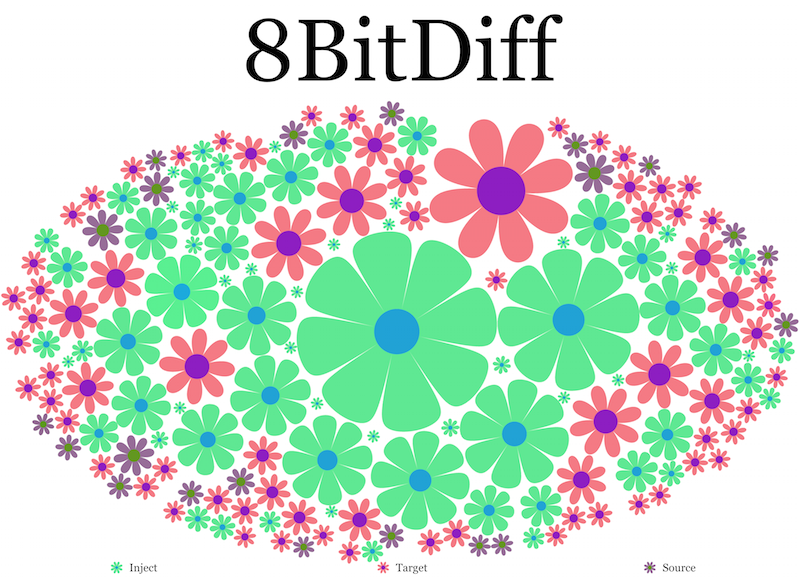 Distribution of injected bytes, source file bytes and target duplicates.
Distribution of injected bytes, source file bytes and target duplicates.
- 4 bits: size of offset bit sizes
- 4 bits: size of length bit sizes
- 1 byte length bit sizes
- 1 byte offset bit sizes
- 2-4 bytes size of injected bytes (4 bytes if first byte msb set, only 2 bytes supported on 8 bit CPUs)
- injected bytes
- loop until end of inject buffer:
- bit: 0=inject, 1=source or target
- length bit cnt+length bits
- if source or target:
- buffer offset bit cnt + buffer offset bits
- sign of offset (not instead of negate)
- bit: 0=source, 1=target
- repeat loop
Target/source/inject source pointers start at the start of each buffer. Any pointer is set to the end of the run after copy and the offset increments/decrements for source for a negative offset, invert the number, don't negate.
- Use the 8BDIFF tool (https://github.com/sakrac/8BitDiff/tools/8BitDiff.cpp) to generate a patch between two files. Load the original file and the patch file and assign them as parameters:
- z8BDiff = Address of patch (ZP)
- z8BSrc = Address of original data (ZP)
- z8BDst = Address to decode updated data (ZP)
- jsr Patch_8BDiff
- Address of the first byte after the patched data is now in z8BDst (ZP)
- Use the 8BDIFF tool (https://github.com/sakrac/8BitDiff/tools/8BitDiff.cpp) to generate a patch between two files. Load the original file and the patch file and assign them as parameters:
- BC = Pointer to original data
- DE = Pointer to where to write patched data
- HL = Pointer to diff data (from the tool)
- call Patch_8BDiff
- Pointer to the first byte after the patched data is returned in DE
Note that the Z80 decoder implementation is untested and very likely not working at all.
- Use the 8BDIFF tool (https://github.com/sakrac/8BitDiff/tools/8BitDiff.cpp) to generate a patch between two files. Load the original file and the patch file and assign them as parameters:
- a0 = Pointer to diff data (from the tool)
- a1 = Pointer to original data
- a2 = Pointer to where to write patched data
- jsr Patch_8BDiff
- Pointer to the first byte after the patched data is returned in a2
Note that the 68000 decoder implementation is untested and very likely not working at all.
I have previously created a VCDIFF decoder in c++ (https://tools.ietf.org/html/rfc3284), which is a curious format. so I thought I would try to implement a version in 6502 assembler. VCDIFF already requires a code table of 1536 bytes, plus by default 768 bytes of "same cache" and 4 bytes of "near cache" and when the code reached 512 bytes of reading out setup for decoding I decided to give up on VCDIFF and try a simpler patching format. Based on files I've patched the patch size is smaller or comparable to VCDIFF. This is just a hobby project and not much effort has been put into testing or other validation. It should be possible to encode with a 0 size source file.
VCDIFF is great for it's purpose, but with multiples of kb of tables it doesn't make any sense for CPUs with a 16 bit address bus. 8BitDiff was optimized around the idea of applying the patch on a CPU with only 3 registers with a small memory footprint. Interestingly 8BitDiff seems to produce smaller patch files than VCDIFF. Currently only up to 4 GB files can be patched.